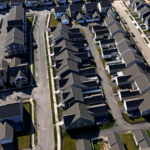California’s largest active fire grew rapidly on Friday evening as bone-dry fuel fed the flames, putting thousands of homes at risk. The Park Fire’s fierce intensity and rapid spread drew parallels to the devastating Camp Fire in 2018, which claimed 85 lives and destroyed 11,000 homes in nearby Paradise.
Over 130 structures have already been destroyed by the Park Fire, with thousands more under threat in Butte, Plumas, Tehama, and Shasta counties. The fire expanded to 374 square miles (967 square kilometers) by Friday night, swiftly moving north and east after it was ignited on Wednesday by a man who pushed a burning car into a gully in Chico and then blended in with the fleeing crowd.
“There’s a tremendous amount of fuel out there, and it’s going to continue spreading at this rapid pace,” said Cal Fire incident commander Billy See. He reported that the fire was advancing up to 8 square miles (21 square kilometers) per hour on Friday afternoon.
Evacuations were ordered in Lassen Volcanic National Park as the fire moved towards Mineral, a community of about 120 people. In other parts of the U.S. West and Canada, communities were also facing wildfires, with lightning strikes sparking new blazes and forcing people to flee their homes.
Tragically, a pilot was found dead in a small air tanker plane that crashed while battling one of the wildfires in eastern Oregon. Across the United States, over 110 active fires covering 2,800 square miles (7,250 square kilometers) were burning on Friday, exacerbated by extreme weather conditions and climate change.
Communities like Tyler in eastern Washington were under imminent threat from wildfires, with evacuations in place. In Chico, California, residents like Carli Parker were forced to evacuate as the Park Fire encroached on their homes. Ronnie Dean Stout, who was arrested in connection with the blaze, was held without bail pending a court appearance.
As fire crews worked tirelessly to contain the blazes, some evacuees faced difficult choices, like whether to stay in their cars or seek temporary shelter. The rapidly spreading fires posed grave dangers to both property and lives, highlighting the urgent need for effective firefighting strategies and climate action.
The wildfires raging across Western states serve as a stark reminder of the escalating threat posed by climate change and the critical importance of proactive measures to mitigate its impact.
Associated Press writers Holly Ramer, Sarah Brumfield, Claire Rush, Terry Chea, Scott Sonner, Martha Bellisle, and Amy Hanson contributed to this report.





